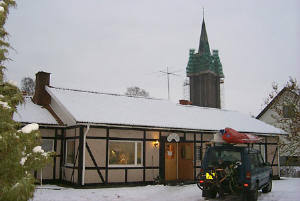|
||||||
|
Climate
Sweden has a temperate climate thanks to the Gulf Stream, and the water is pretty much the same as it is in Great Britain/Germany/Denmark; the main difference is that there is usually less rain and more sunshine in the summer. Sea temperatures, particularly on the West Coast, are slightly higher than the English Channel/Baltic Sea in the summer. You can have the same type of clothes as you would have for a summer visit to the British Isles or the Baltic Sea region. Winter temperatures are slightly lower than they are in UK/G/DK/NL, but it is a "dry" cold that is not at all unpleasant.
|
|
|
Holiday times
Schools start their summer holidays at the beginning or middle of June and start back again in the middle or end of August. This varies, however, as each municipality determines its own holiday period. The general industrial holiday covers the month of July. Children have a one-week's skiing holiday in March (weeks 7-10) and one week at Easter. In the autumn there is a one-week break (usually week 44) and two weeks are free over the Christmas/New Year period, with schools going back around January 10.
Languages
Kingdom of Sweden, Konungariket Sverige. National or official language: Swedish. 8,875,000 (1998 UN). Literacy rate 99%. Also includes Tosk Albanian 4,000, Amharic, Assyrian Neo-Aramaic, Chaldean Neo-Aramaic, Danish 35,000, Estonian 1,560, Western Farsi 35,000, Greek 50,000, Kirmanjki, Kurmanji 10,000, Latvian 450, Lithuanian 310, Bokmaal Norwegian 28,000, Serbo-Croatian 120,000, Somali, Spanish 35,000, Turkish 20,000, Turoyo 20,000, Chinese, people from Iraq 6,000, Eritrea, North Africa. Information mainly from B. Comrie 1987; I. Hancock 1991; E. Haugen 1992; O. Dahl 1996; B. Winsa 1998. Christian, secular. Blind population 15,716. Deaf population 8,000 to 532,210 (1998). Deaf institutions: 72. The number of languages listed for Sweden is 15. Of those, all are living languages. Diversity index 0.37.
Money
Sweden still has its own currency, the Swedish krona and öre. There are no restrictions on the import and export of money. The following notes are available: 20, 50, 100, 500, 1000 and the coins are 50 öre, 1, 5, 10 krona. 1 krona = 100 öre, the lowest value coin is 50 öre
Most post offices exchange money.
The service charge for exchanging foreign currency is SEK 20-35 irrespective of how much money you exchange. (The Post Office: 35) Currency specialists do not charge. The service charge for traveller's cheques is as follows: Forex - SEK 15/cheque. The Post Office - SEK 50 up to 10 cheques. Then SEK 5/cheque Banks - different rules apply.
Population
Size: 8,9 million. Stockholm/surroundings: 0,7/1,8 million inhabitants. Göteborg/surroundings: 0,5/0,8 million inhabitants. Malmö/surroundings: 0,26/0,5 million inhabitants. Non-Swedish citizens: 6%. Citizens born outside Sweden: 10,6%. Population density: 20 inhabitants/km2. Average life expectancy: Men 77,4 years, women 82,3 years. Language: Swedish. Religion: 87% Lutheran church.
Time
Sweden uses Central European Time (CET) which is one hour ahead of Greenwich Mean Time. From March until the end of October summer time prevails which means the clocks are put forward one hour. Sweden and Germany have the same schedule for switching between summer time and winter time.
Electricity
220V AC current is used in Sweden.
Emergency calls
Police, fire and ambulance services can be reached by dialing 112. Calls are free.
|
|

